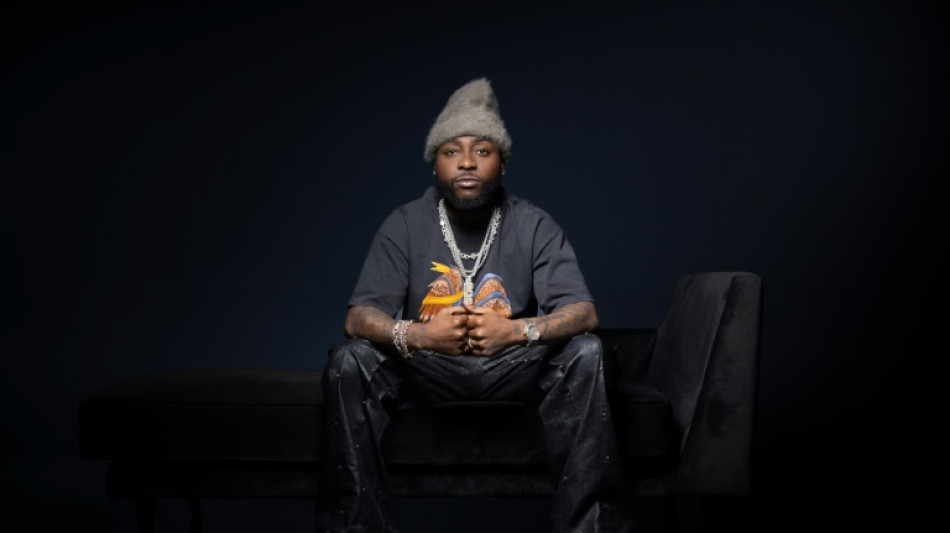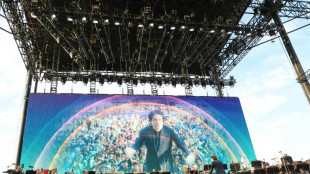

Afrobeats star Davido sees Nigeria's star rising
The way Davido sees it, Nigerian culture is having a moment.
"We're very popular, not only in music," the 32-year-old Afrobeats star told AFP during a recent interview in Paris, pointing to the film, food and fashion influence his country is increasingly exporting to the rest of the world.
Even amid criticism from some that American artists are starting to crib from Afrobeats' sound, his response is: "I like it."
And yet, the Nigerian-American artist -- a self-described citizen of the world -- sees the future of the continent tied to those who stay home, rather than its influential diaspora.
"Everybody always has the American dream," he told AFP. "Every kid that grows up in Africa wants to visit America. That's cool. It's okay to visit, but don't leave your people and go there."
Those might be tough words to swallow for his compatriots battling the worst economic crisis in a generation.
In recent years, "japa" -- the Yoruba word for "escape" -- has become country-wide slang for emigrating to greener, and richer pastures.
Davido, born David Adedeji Adeleke in Atlanta, in some ways straddles the tension between a growing, bustling Nigeria of more than 200 million people and a world that finally seems to be waking up to the so-called Giant of Africa.
Speaking to AFP ahead of the release of his new album, "5ive" -- out Friday -- he confidently says the record "is going to touch every part of the world."
"We have music for the French people. We have music for the Caribbean people. We have music for the Americans, Africans, everybody," he said.
"It's like a full, global package album."
- Eight million monthly listeners -
With some more than eight million monthly listeners -- including Britain's King Charles -- Davido is riding, and shaping, the global Afrobeats craze.
But Davido himself is also a product of African music.
"I grew up in an African household where we were always throwing parties, music was always playing in the house, going in the car to school, my parents playing music," he enthusiastically recalled.
As a teenager, a cousin in the industry took him to a studio, where "for the first time, I saw somebody create music... African music."
"That's when I fell in love with it," said Davido, spotting a grey conical woollen cap and jewellery dangling over a black T-shirt.
A few years later, he was mixing and mastering his own tunes by the age of 16, drawing inspiration from artists such as P-Square, a Nigerian duo that drew some of their hits from American influences such as Michael Jackson.
Davido now sees artists' musical influence flowing across the Atlantic in the other direction.
"It's a privilege for another culture to try to imitate what you're doing," he told AFP in response to a question about critics who accuse American artists of trying to mime Afrobeats' style.
"In Nigeria we do hip hop too. We have rappers that rap. We have people that do R&B."
"Music is a universal language. So I don't see any problem with that."
Davido counts among some of his popular tracks "Unavailable" and "Aye".
- 'African music has changed narrative' -
For all his worldly outlook, Davido said he hasn't lost focus on Nigeria.
"We've been going through hard times," he told AFP. "Nigeria is a very rich country with so much talent, so much grace, so much opportunity."
"I was asked a question saying, why don't we sing about (Nigeria's struggles) in our music?" he recalled. "I was like, man, that's not the type of music my people would really like to hear."
"I have sung about it in the past. But I'm very vocal about it more in Africa than in America."
As he prepares to embark on a world tour -- including stops in Paris, London, New York, Atlanta, and Los Angeles -- he knows where at least part of his success has come from.
"African music has changed the narrative of how Africans are looked at around the world."
L.al-Samahiji--BT




